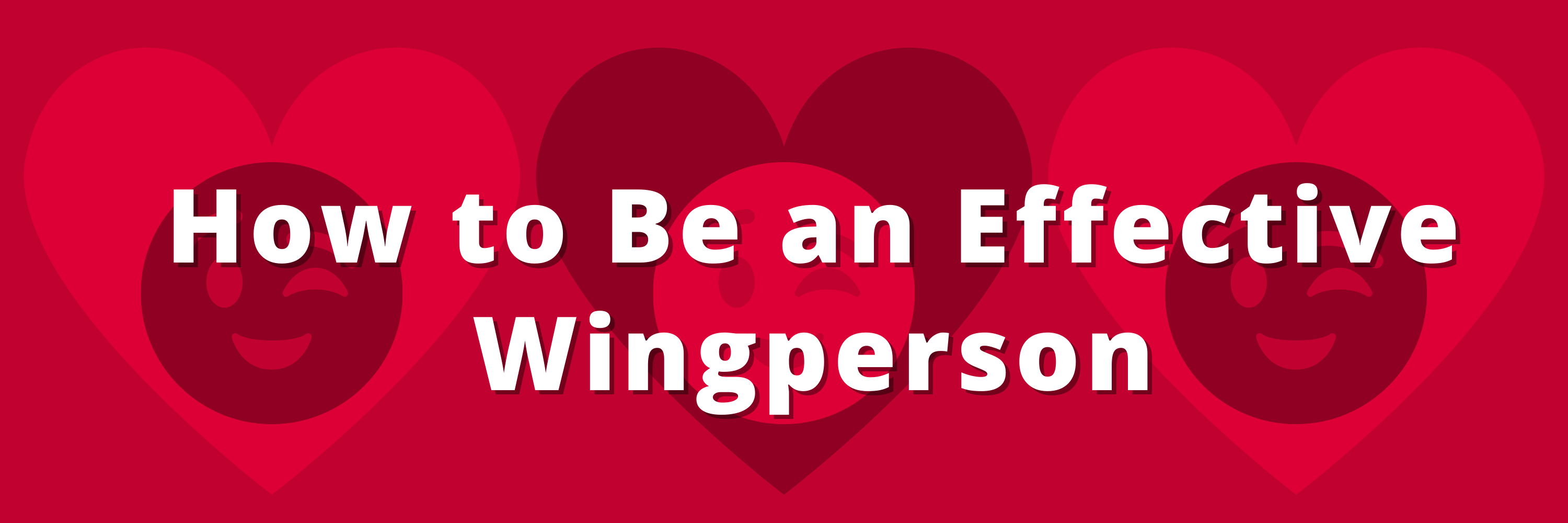What is a “Wingperson”?
A “wingperson” is someone who acts as a matchmaker for a friend -- whether that involves setting them up with a romantic interest or purely for a sexual hookup. The wingperson’s role is supportive and involves actions such as checking in on their friend, intervening if their friend needs help leaving an uncomfortable situation and fostering a judgment-free environment.
Why is the Job of a Wingperson Important in College?
The wingperson has the important job of helping to keep their friend safe, especially during a social event where alcohol and/or other drugs may be involved. When matchmaking occurs at a social event, social pressures may arise that influence someone’s decision to engage in a hook-up. It is the wingperson’s job to assess their friend’s boundaries and limit any unwanted pressures that may cross them.
Data
Among UC Davis Students we surveyed in Spring 2021 (N=45)
- 63% have served as a wingperson for a friend
- 84% said it was common for friends to act as a wingperson for each other
- 63% report having a conversation with their friend prior to acting as a wingperson to create a game plan
- 36% carry safer sex products for each other when going out -- just in case!
How to be an Effective Wingperson
An effective wingperson monitors their friends in social situations and does not create pressure to engage in a hookup. In situations where alcohol is involved, a wingperson:
- Watches drinks
- Has a plan for getting home
- Gets information on where their friend is going and when they are coming back
- Gets consistent feedback on how much each person has been drinking
- Carries safer sex products for their friend
In the case that an unsafe situation occurs, the wingperson is ready to step in, either directly or indirectly, to remove the friend from the situation.
Topics to Discuss Before Setting Up a Friend
- Boundaries - Is your friend comfortable going into a private room with someone? Do you plan to leave the party together or is your friend ok leaving with someone else? Discussing these boundaries beforehand can help your friend identify their comfort levels for different situations.
- Alcohol/Other Drugs - How much is your friend comfortable drinking? Consider setting limits and helping your friend stick to them. Remember that consent is not possible when someone is incapacitated.
- Involvement - How involved does your friend want you to be? Will you play an active role in setting up your friend or simply monitor the situation?
- Landmarks - If you are in an unfamiliar environment, designate spots to check in with your friend later on. You can return to these landmarks if you get separated or lost.
Strategies for Checking in with a Friend
- Texting - The easiest way to check in on your friend and assess the situation is to send a private message. It’s quick, discreet, and lets you know what your friend needs from you right away. If your phone allows, you may also consider sharing your locations with each other as an added safety measure.
- Hand Signals - You can create hand signals with your friend to avoid miscommunication about a date or hookup. We recommend that your hand signals cover the following:
- You are having a good time! Things are going well
- You are not interested in continuing the date/hookup
- You are in an uncomfortable position and need your friend to intervene
- Check in again in _____ minutes!
- Decide together how often check-ins happen. Remember that you may want to decide to check-in more frequently as time goes on or as needed depending on the situation -- especially if alcohol or other drugs are involved!
- Code Words/Phrases - Similar to hand signals, you can create code words before a date or hookup to communicate information you don’t wish to say out loud.
Ways to Step In
If you are unsure how your friend feels, you can physically check in by asking a brief “how are you doing?” This may disrupt the flow of conversation, but will allow you to know your friend is safe.
If your friend needs help leaving a date/hookup you can use the 3 D’s to intervene: Direct, Distract, Delegate.
- Direct: Point out any inappropriate behavior in a safe and respectful manner
- Distract: Help your friend leave the situation by making an excuse or distraction
- Delegate: Appoint someone else to help remove your friend from the situation
Remember
While your responsibility as a wingperson is to intervene if possible, it is never your fault if an unsafe situation -- such as a sexual assault -- occurs. What’s important is that you believe what your friend tells you and that you do not dismiss their assault as “bad sex” or a “regrettable hookup.”
For sexual assault resources, including information on how to support someone after an assault, check out the CARE’s How to Help Someone page on their website.

